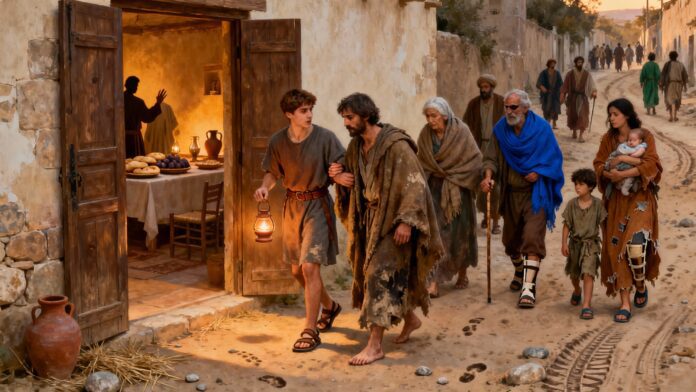Gospel of Jesus Christ according to Saint Luke
At that time,
during a meal at the home of a Pharisee leader,
Upon hearing Jesus speak, one of the guests said to him:
«Blessed is he who will partake of the meal
in the kingdom of God!»
Jesus said to him:
«A man was giving a grand dinner party,
and he had invited a lot of people.
At dinnertime, he sent his servant
tell the guests:
“Come, everything is ready.”
But they all unanimously began to apologize.
The first one said to him:
“I bought a field,
and I have to go see him;
Please, excuse me.”
Another one said:
“I bought five pairs of oxen,
and I'm going to try them out;
Please, excuse me.”
A third person said:
“I just got married,
And that's why I can't come.”
Return,
The servant reported these words to his master.
Then, overcome with anger,
The master of the house said to his servant:
“Hurry up and go to the squares
and in the streets of the city;
the poor, the crippled, the blind and the lame,
Bring them here.”
The servant returned and told him:
“Master, what you have commanded is done,
and there's still room."”
The master then said to the servant:
“Go on the roads and the paths,
and force the people in,
so that my house may be filled.
For, I tell you,
none of these men who had been invited
"He won't taste any of my dinner."”
– Let us acclaim the Word of God.
Filling the Father's house: welcoming without reservation those whom God attracts
Rereading the parable of the great supper reveals the universal call of grace and the pressing mission of Christian hospitality..
In God's heart, there is a longing for fullness: for his house to be filled. The Gospel according to Saint Luke (14:15-24) presents a master who invites, who pleads, and then commands that guests be sought everywhere to share his joy. Through this parable, Jesus reveals the dynamic of the Kingdom: the love that calls, the freedom that hesitates, the mission that leads to crossroads. This article explores the spiritual, social, and practical implications of this powerful text, to learn today how to "bring" people into the Lord's rest.
- Context: a refused banquet, the urgency of a phone call
- Central analysis: the reversal of the guests
- Three key areas: the freedom to respond, the pressing mission, the joy of the Kingdom
- Applications: faith, community, everyday life
- Biblical and traditional resonances
- Meditation and practice track
- Contemporary challenges: inclusion and freedom
- Liturgical prayer
- Practical conclusion and roadmap
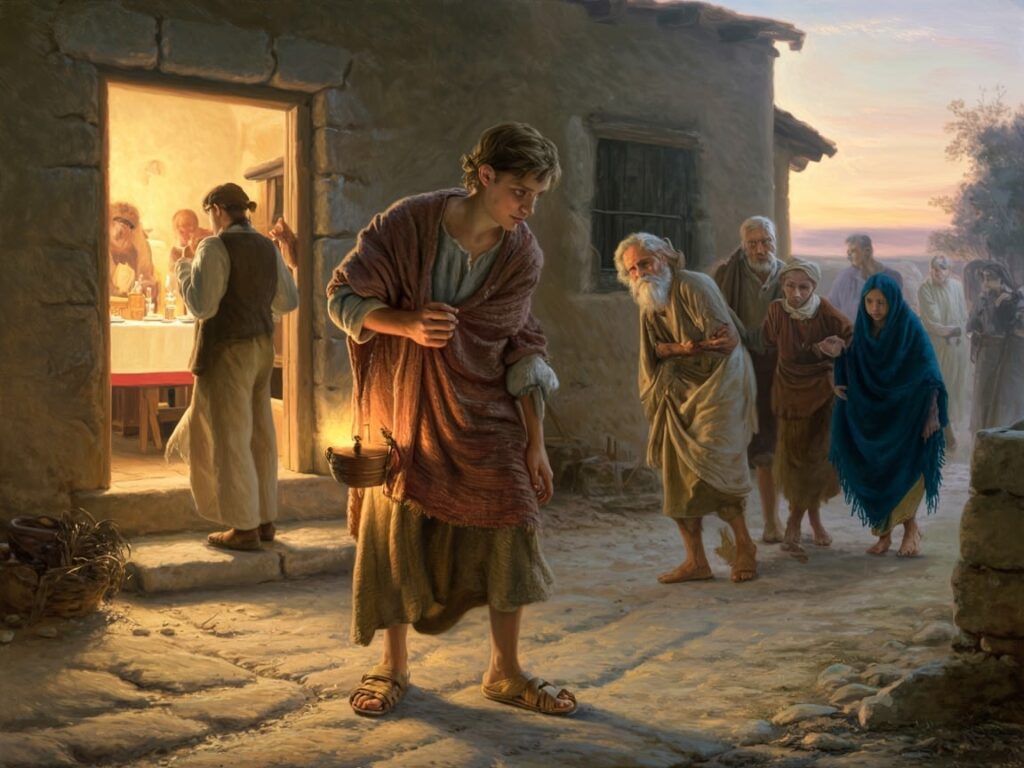
Context
The parable of the great supper is part of a series of teachings of Jesus recorded by Luke, often addressed to the Pharisees and the leading figures of the community. Here, the setting is a Sabbath meal, a symbol of communion, but also of social distinction. One of the guests, struck by the Rabbi's words, exclaims: "Blessed is the one who will eat at the feast in the kingdom of God!" Jesus responds with a story that immediately shifts the perspective: the promised happiness will not be reserved for those who believe themselves close to the Kingdom, but for those who actually choose to enter it.
This narrative operates on three levels: the social reality of the banquets, the spiritual call to salvation, and the ecclesial mission of the disciples. Through the dynamic of the invitation refused, then extended again to the poor and marginalized, and then further broadened to the outskirts, a geography of salvation emerges: first Israel, then the peripheries, and finally the nations.
This text is thus a parable of universal grace. The master of the feast symbolizes God, while the servant—an image of Christ and his disciples—becomes the instrument of his eagerness. The excuses of the first guests represent material attachments, obsessions with power or success, and the compromises of a comfortable life. Each offers a legitimate reason: work, possessions, marriage—but all reveal a resistance to the divine invitation.
The master's anger is not vengeance, but the fire of frustrated love: a love that cannot remain sterile. And the culminating phrase – «Go out into the highways and country lanes, and compel people to come in, so that my house may be filled» – encapsulates God's missionary passion: not to coerce by violence, but to urge through charity.
The expression "to force entry" must be reinterpreted in light of the crucified Christ, who draws people to himself without coercing them. It is a "force of love," one that convinces through kindness and perseverance.
Analysis
The central idea of the text lies in the tension between invitation and response. God always invites, but humanity finds a thousand reasons to hesitate. Within this tension unfolds the spiritual drama of freedom and the Father's mercy.
The parable overturns the usual hierarchies: the first refuse, the last are welcomed. But it doesn't just moralize – it reveals the logic of the Kingdom: what the powerful neglect becomes the joy of the poor.
The great supper symbolizes the salvation offered – fullness, reconciliation, communion. The «poor, crippled, blind, lame» embody those who have no merit to their credit: they represent wounded humanity, the very humanity Jesus comes to seek. Where the privileged see an inconvenience, God sees an opportunity for love.
This reversal is not mere social altruism: it is a theological revelation. God cannot tolerate emptiness in his house; he acts until the feast is complete. Human refusal cannot curb the fervor of his desire. Thus, "bringing in" becomes the image of mission: the Church is called to invite insistently, not to wait for hearts to open of their own accord, but to go and find them on the roads, places of wandering and encounter.
The text also carries an eschatological note: one day, dinner will be ready, the table set. Who will be there? Those who have heard and responded. The issue is not only moral, but existential: to recognize the call today and answer it before it is too late.
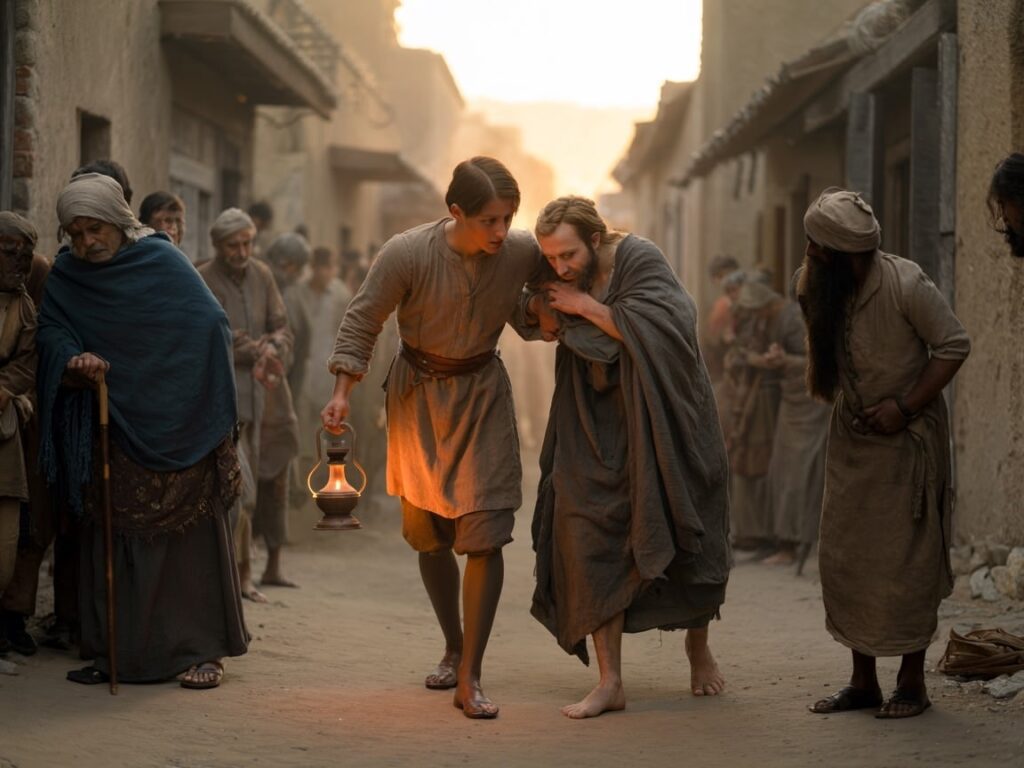
Freedom and resistance
The three excuses recounted by Jesus do not refer to gross faults, but to poorly ordered priorities. One owns a field – material concerns; another, oxen – professional success; the third, a marriage – emotional attachment. These realities are good in themselves; but they become obstacles when they absorb everything.
The spiritual tragedy lies in preferring partial good to the supreme good. The parable shows how human freedom can be restricted under the guise of legitimate responsibilities.
This imbalance resonates in our modern lives: how many spiritual calls are stifled by "fields," "oxen," or "covenants"? God does not use violence; he invites. But his call disturbs our comforts. His house is filled only when someone chooses to step outside of themselves.
The first conversion, therefore, is one of perspective: recognizing the incomparable value of the invitation. Freedom becomes complete when it is placed at the service of the love offered.
The missionary urgency
The servant becomes the protagonist: he runs, he returns, he leaves again. Each refusal at the banquet sends him further. This dynamic reflects the Christian mission: to go, to invite, to persist, until the house is full.
The expression "on the roads and in the paths" underscores the migration of salvation: from the center to the margins. It invites us to go beyond the usual circles to reach the existential peripheries.
In the Christian tradition, this injunction has fostered missionary vocations, but also an art of hospitality: catechumenate, welcoming the poor, and evangelization at the local level. The urgency is not primarily quantitative—filling at all costs—but qualitative: making everyone feel that they are expected, loved, and wanted.
Mission is not proselytism; it is active compassion. It reflects God's zeal to share his joy. The Christian, a servant of this zeal, becomes a witness not through obligation, but through contagion.
The Joy of the Kingdom
The master doesn't just want to fill his house for strategic reasons, but to share in the celebration. The banquet only has meaning in the context of communion.
This joy of the Kingdom is a reversal of human logic: the excluded become honored guests. This image of the "lame and blind" expresses the heart of the Gospel: God heals by welcoming, and welcomes by healing.
Each Eucharist reenacts this scene: our busy world often refuses the invitation, but God persists in setting the table. Matthew's Alleluia – "Come to me, all you who are weary and burdened…" – aptly completes the message: God invites not those who deserve it, but those who need rest.
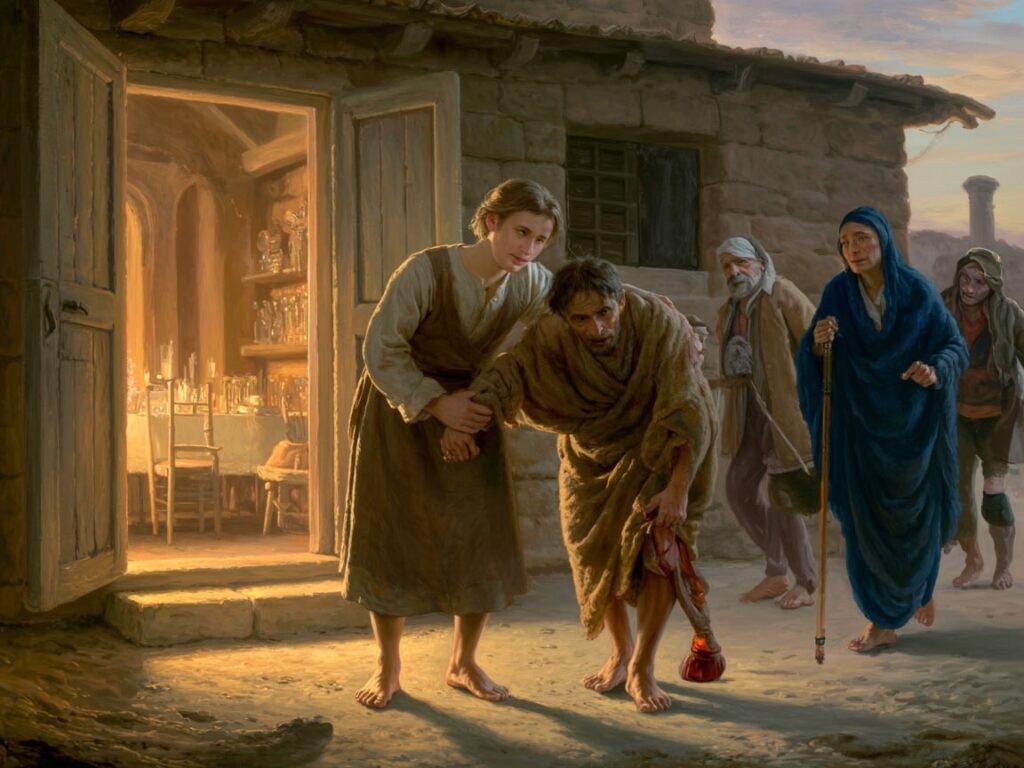
Implications
In spiritual life: Learning to recognize God's daily call: morning prayer, the word heard, service offered. Responding requires not heroism, but availability.
In community life: The Church is this house that must be filled. Every parish, every home can become a place of welcome: shared meals, listening to the isolated, being present with the sick.
In social life: This parable inspires a culture of hospitality: reaching out to those we forget, opening spaces where everyone has a place.
In the personal mission: We become servants by going out on our own "routes": workplaces, neighborhoods, digital networks. Everywhere, there are hearts waiting to be invited.
Traditional resonances
The Church Fathers commented extensively on this parable. Saint Augustine saw in it an image of the vocation of nations: "God invites not those satiated with their own righteousness, but those hungry for mercy." Origen emphasizes the progressive pedagogy: God begins by calling those he knows, then teaches the servant to go further.
Saint Gregory the Great reads in it the apostolic mission: the roads symbolize the world, the paths, the inner paths of consciousness.
In the liturgy, this dynamic is reflected in the Eucharistic call: "Blessed are those who are invited to the Lord's Supper." Each Mass makes this invitation a reality.
Monastic tradition, for its part, developed the theme of hospitality as participation in this divine feast. To welcome a guest is to welcome God himself, according to the Rule of Saint Benedict.
Thus, from the biblical text to the concrete action, the same movement continues: to make the human house a reflection of the Father's house.
Meditation track
- Read slowly the passage from Luke 14:15-24, imagining the scene of the banquet.
- Identify the excuses that resonate with your own life: what is preventing you from responding?
- Listen to the master's insistence: what inner "path" is he inviting you to take?
- Make a simple commitment: invite someone to share a moment of fellowship (meal, listening, prayer).
- Conclude with a prayer of surrender: "Lord, help me understand your desire for fullness. Give me your zeal to reach out to others."«
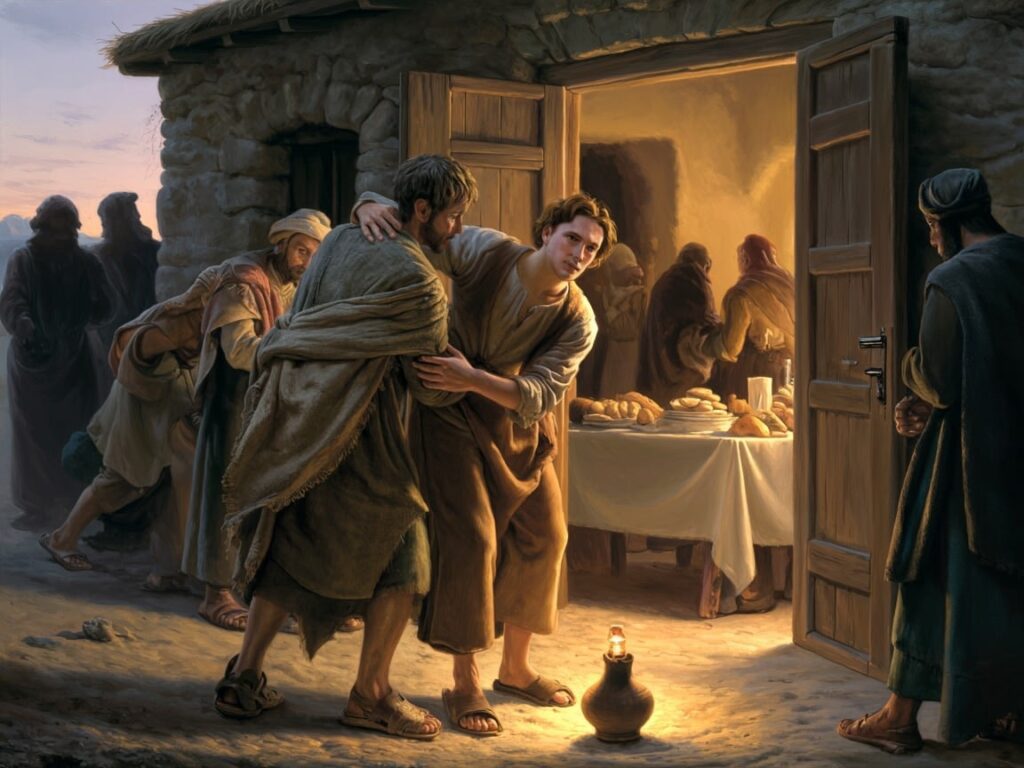
Current issues
Today, how can we "bring in" without forcing it? In a society that values absolute freedom, any insistence seems suspicious. Yet, true freedom is born from the encounter with loving truth.
The challenge for Christian communities is to combine unconditional welcome And bold announcement. Too often, one is done without the other: an opening without content, or a message without kindness.
Another challenge is authentic inclusion: not admitting everything without discernment, but recognizing the dignity of each individual.
Finally, in the digital world, the "roads" become virtual: forums, networks, conversations. Here too, the aim is to bring people in, not through proselytizing, but through the power of personal testimony.
The Gospel of the great supper reminds us that God's zeal never tires: he sends, again and again, until his joy is shared.
Prayer
Lord, Master of the great feast,
You have prepared a meal of love and joy for your people.
You invite us, and often we are slow to come.
Forgive our hesitations, our detours, our excuses.
Send your Spirit upon your servants,
that they walk on the roads and paths,
that they may carry your call to the most distant hearts.
Give your Church the breath of your hospitality,
that no poor person, no wounded person, no lost person
don't stay outside when the table is set.
You who call each one by name,
Help us discern to whom we should extend our hand today.
Fill your house, Lord, not with anonymous crowds,
but of beloved faces, gathered together by your peace.
Then your Kingdom will come,
and the eternal feast will begin.
Amen.
Conclusion
The parable of the great banquet remains a mirror for our lives. God calls ceaselessly, and his joy is complete only when everyone has a place. Our mission is not to invite only those who are like us, but to seek out those who are still unaware that they are expected.
Filling the Father's house means participating in his own passion for humanity: transforming every encounter, every service, every word of peace into a plate placed on the table of the Kingdom.
Then the promise is fulfilled: "Come to me, all you who are weary and burdened..." The Lord's rest becomes a shared welcome.
Practical
- Identify each day a discreet "call" to welcome or invite.
- Create a weekly "open table" for neighbors, friends, believers or not.
- Meditating on Luke 14:15-24 as a communal examination of conscience.
- Re-evaluating one's priorities: what comes before the Lord's invitation?
- Participate in a parish or community hospitality initiative.
- Pray for those who still refuse the call, without judgment but with hope.
- Note the "roads" and "paths" where the Gospel leads you (real or virtual).
References
- Gospel according to Saint Luke 14:15-24.
- Gospel according to Saint Matthew 11:28.
- Saint Augustine, Sermons on parables.
- Origen, Homilies on Luke.
- Saint Gregory the Great, Homilies on the Gospels.
- Rule of Saint Benedict, chapter 53: "On the reception of guests".
- Catechism of the Catholic Church, §§ 543-546.
- Pope Francis, Evangelii Gaudium, no. 23-49: «The Church on the move».

